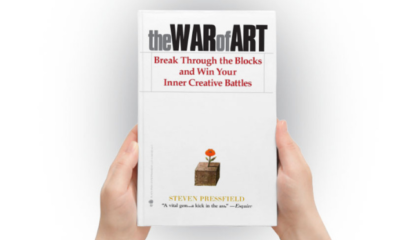Success Advice
10 of The Best Financial Education Books That Wealthy People Read

You don’t just need money to build an empire, you need great knowledge, usually from financial education books that will feed you with nuggets of wisdom needed to amass, maintain and increase your wealth.
There are a number of financial education books that have built a great reputation over the years for providing insightful and mind-opening education that has changed the lives of many people. Finding a book that answers the financial questions that have remained a puzzle in your quest for success is a life-changing experience.
Here is a collection of some of the best financial education books that have shaped the lives of some of the newest wealthy individuals across the globe and inspired them to take up challenges that have made them remarkably successful.
The Best Financial Education Books:
1. Rich Dad, Poor Dad
Rich Dad, Poor Dad is arguably the most insightful book that has changed the way people look at investments and employment. It does not only give insights on how and why you should invest, but also challenges the reader to cultivate this culture among children.
In this book, Robert Kiyosaki will show you the difference between a wealthy man and a poor man and the decisions that define each one of them. Robert Kiyosaki continues these insights in a series of Rich Dad books that you will find useful in financial education such as Unfair Advantage and Rich Dad’s Cash Flow Quadrant.
2. The Millionaire Next Door
Stanley and Danko interviewed a number of millionaires in an effort to find a common denominator among wealthy people. After obtaining these views, the two wrote a book “The Millionaire Next Door‘, which has become one of the most sought after financial education books.
According to the book, the rich budget, live below their means and allow their grown-up children success independently. This will show you how to solve the investing equation on saving and earning money. Perhaps you are always trying to figure out the nature of things that go through the brain of a millionaire.
3. The Intelligent Investor
Warren Buffett describes “The Intelligent Investor” written by Benjamin Graham as the best book that has ever been written on investing. It will give you fundamentals of value investing by taking you through two different approaches of investing especially in stock markets at length. The main emphasis is that you should conduct deep and thorough research on an investment because into translates to superior results.
4. Street Smarts
Jim Rodgers has helped people in realizing that you must be smart in class, in the market and on the street. The book “Street Smarts” gives readers the hard facts on the streets and markets that are intriguing and shrewd. Through this book, you will learn how to predict the markets and tune your finances to take advantage of the next big thing.
5. Think and Grow Rich
Napoleon Hill is popular among millionaires for motivational literature found in his financial education book, Think and Grow Rich. It describes timeless principles for personal achievement; principles of success for every aspect of life. It was written after the great depression of 1929, and is the end product of two decades of research conducted by Napoleon Hill. His research started when Andrew Carnegie (the steel tycoon who was then the richest man on earth) gave him the assignment of organizing a Philosophy of Personal Achievement. Napoleon Hill, who was a poor journalist, armed with just an introductory letter from Carnegie, set out to interview over five hundred successful people including Henry Ford, Thomas Edison, Alexander Graham Bell, John D. Rockefeller, George Eastman, William Wrigley Jr. and Charles M. Schwab. Hill then revealed the priceless wisdom of his research in the form of the thirteen steps to success. No matter when this book was written, the stories and lessons are still relative today.
6. One Up On Wall Street
Peter Lynch is one of the authors that was bold enough to expose his readers to the circles of stock markets through his book “One Up On Wall Street.” The author has used a commonsense approach by encouraging the readers to concentrate on what they know instead of chasing the latest fad on Wall Street. The most interesting thing about this book is that it teaches the potential investor to look around them and capitalize on idle resources and untapped opportunities.
7. The Little Book of Common Sense Investing
The Little Book of Common Sense Investing is one of the most favorite books for billionaires. In this book John Bogle teaches investors how to follow their investments to ensure that they yield returns. The author teaches wealth owners the significance of diversifying their portfolio and investing for the long term.
8. Do What You Love And The Money Will Follow
People who have derived their wealth from their God-given talents and passion for their jobs read Marsha Sinetar’s book “Do What You Love, the Money Will Follow“. This book is an excellent read for students who are still at their early stages of building their careers and businesses.
9. Secrets of the Millionaire Mind
Read Secrets of the Millionaire Mind: Mastering the Inner Game of Wealth by T. Harv Eker and it will change how you look at yourself and how you make money. This book is excellent as it takes you into the mind and the beliefs of wealthy people. It also includes excellent strategies and plans for you to change your money blueprint and reach financial success. Remember, the change of attitude is just as important as financial education itself, and T. Harv Eker shows you how to switch it up.
10. The Money Book For The Young, Fabulous And Broke
Suze Orman saw the niche in young people who had just left college without any form of financial literacy and wrote a financial education book to enlighten them on the steps to making money.
“The Money Book for the Young, Fabulous & Broke” equips the “illiterate” with the knowledge they need to understand the markets, credit and home ownership to change the attitude of young people who are always intimidated by volumes of financial information provided in the financial markets.
Thank you for checking out our list of the best financial education books.
Please leave a comment and let us know of any financial education books that you have read lately that are worth noting on this list and we will be happy to mention them in an updated version of this post.
Business
Why Smart Entrepreneurs Are Quietly Buying Gold and Silver
When stocks, property, and cash move together, smart business owners turn to one asset that plays by different rules.

You’ve built your business from the ground up. You know what it takes to create value, manage risk, and grow wealth. But here’s something that might surprise you: some of the most successful entrepreneurs are quietly adding physical gold and silver to their portfolios. (more…)
Business
The Simple Security Stack Every Online Business Needs
Most small businesses are exposed online without realising it. This simple protection stack keeps costs low and risks lower.

Running a business online brings speed and reach, but it also brings risk. Data moves fast. Payments travel across borders. Teams log in from homes, cafés, and airports. (more…)
Business
If Your Business Internet Keeps Letting You Down, Read This
From smoother operations to better security, dedicated internet access is quietly powering today’s high-performing businesses.

Today, a dependable internet service is the bedrock for uninterrupted business operations. Many organizations rely on stable online connections for communication, data transfer, and customer interaction. (more…)
Did You Know
How Skilled Migrants Are Building Successful Careers After Moving Countries
Behind every successful skilled migrant career is a mix of resilience, strategy, and navigating systems built for locals.

Moving to a new country for work is exciting, but it can also be unnerving. Skilled migrants leave behind familiar systems, networks, and support to pursue better job opportunities and a better future for their families. (more…)
-

 News3 weeks ago
News3 weeks agoBrandon Willington Builds 7-Figure Business by Ignoring Almost Everything
-

 Health & Fitness4 weeks ago
Health & Fitness4 weeks agoWhat Minimalism Actually Means for Your Wellness Choices
-

 Did You Know3 weeks ago
Did You Know3 weeks agoWhy Most Online Courses Fail and How to Fix Them
-

 Business4 weeks ago
Business4 weeks agoIf Your Business Internet Keeps Letting You Down, Read This
-

 Business2 weeks ago
Business2 weeks agoEntrepreneur’s Guide to Pay Stubs: Why Freelancers and Small Business Owners Need a Smart Generator
-

 Business2 weeks ago
Business2 weeks agoThe Salary Shift Giving UK Employers An Unexpected Edge
-

 Scale Your Business2 weeks ago
Scale Your Business2 weeks ago5 Real Ways to Grow Your User Base Fast
-

 Business2 weeks ago
Business2 weeks agoThe Simple Security Stack Every Online Business Needs






























25 Comments